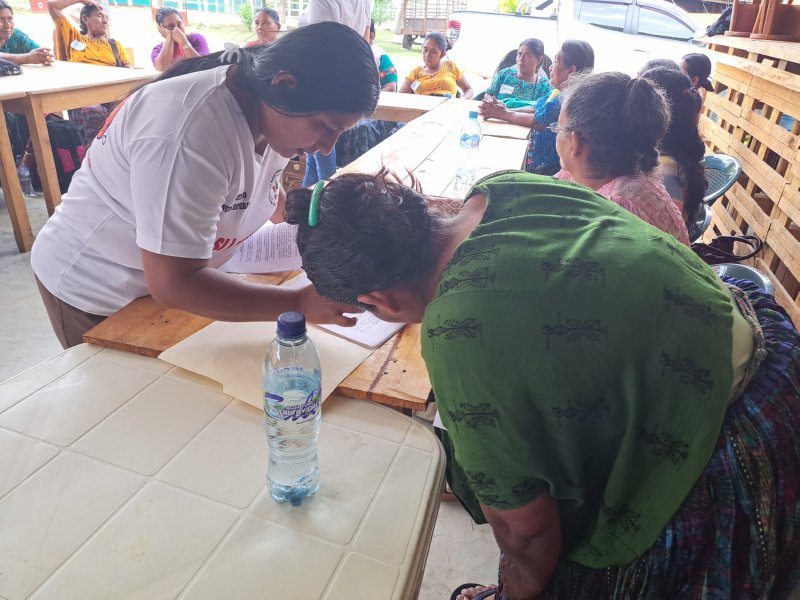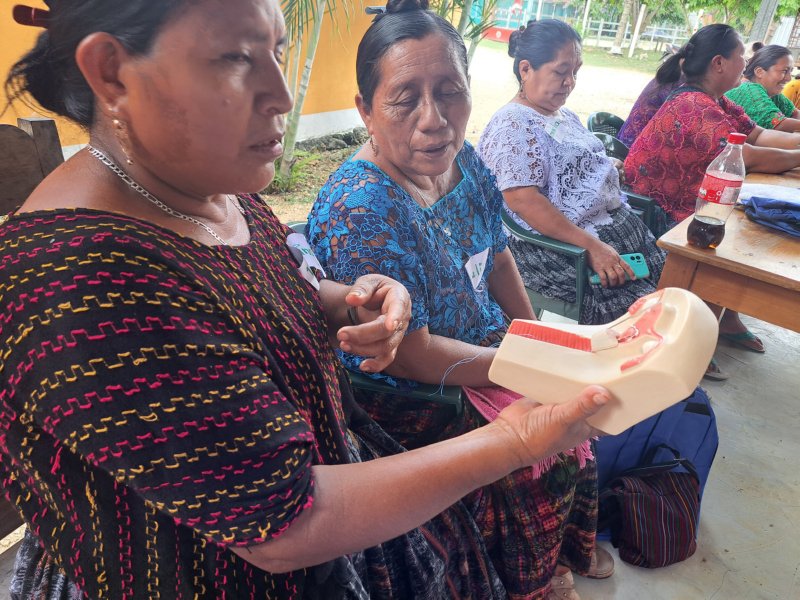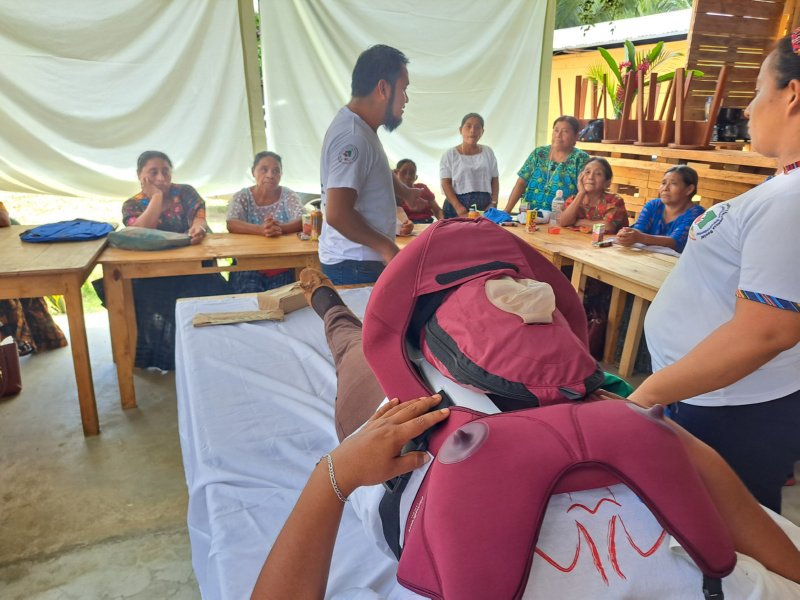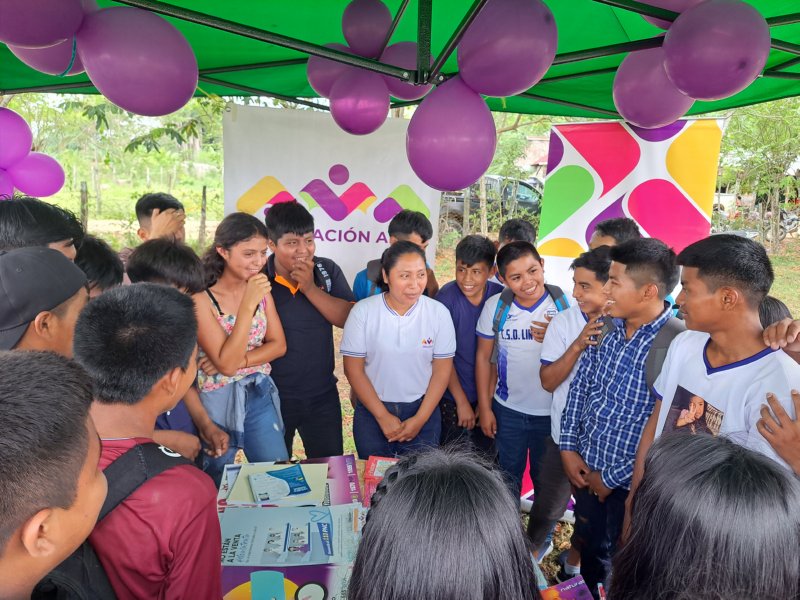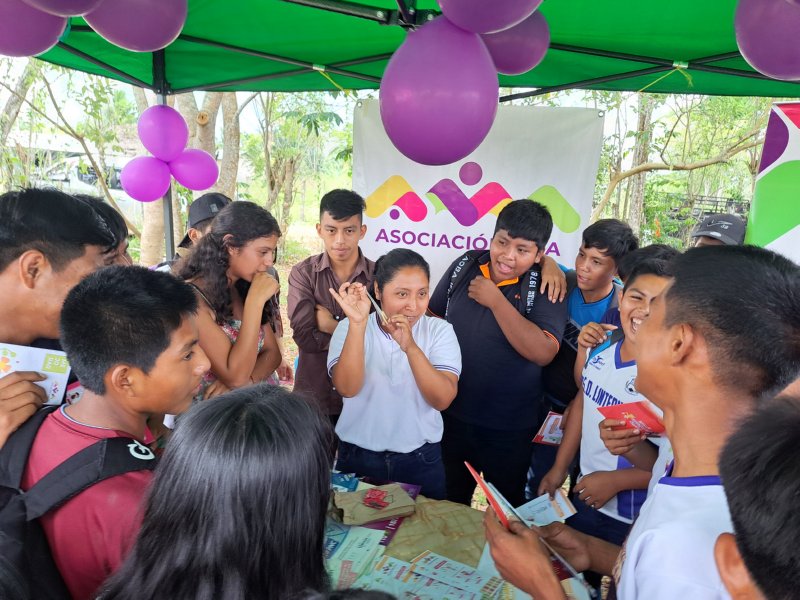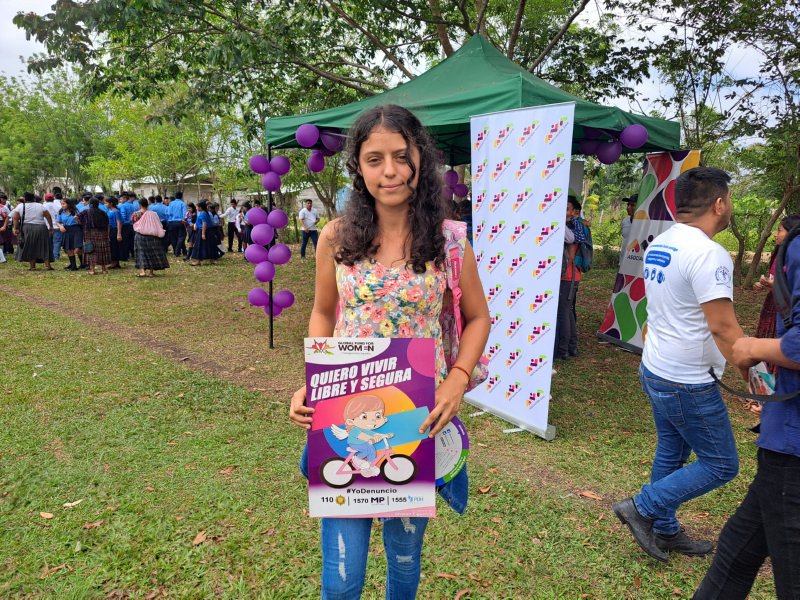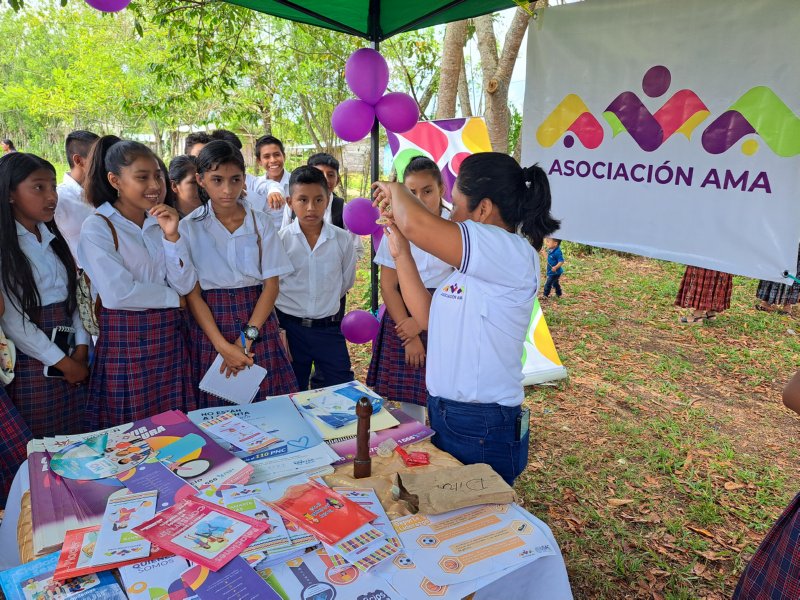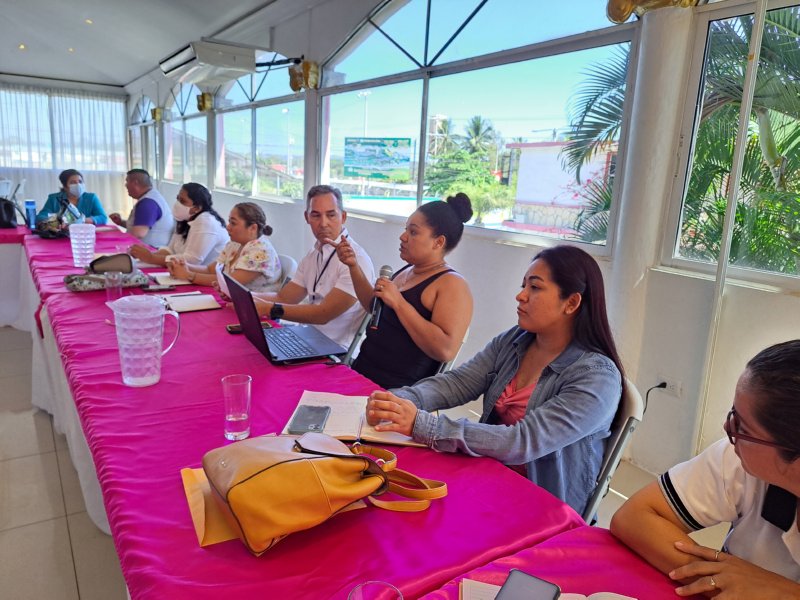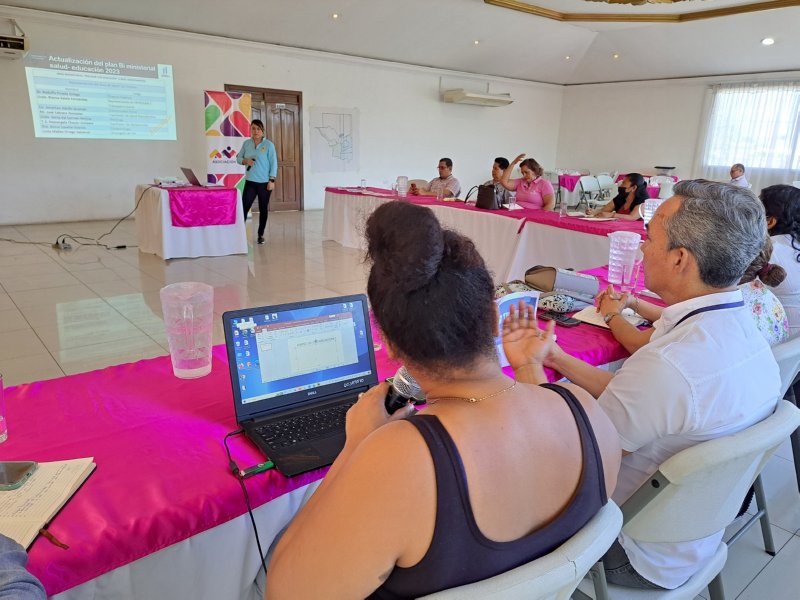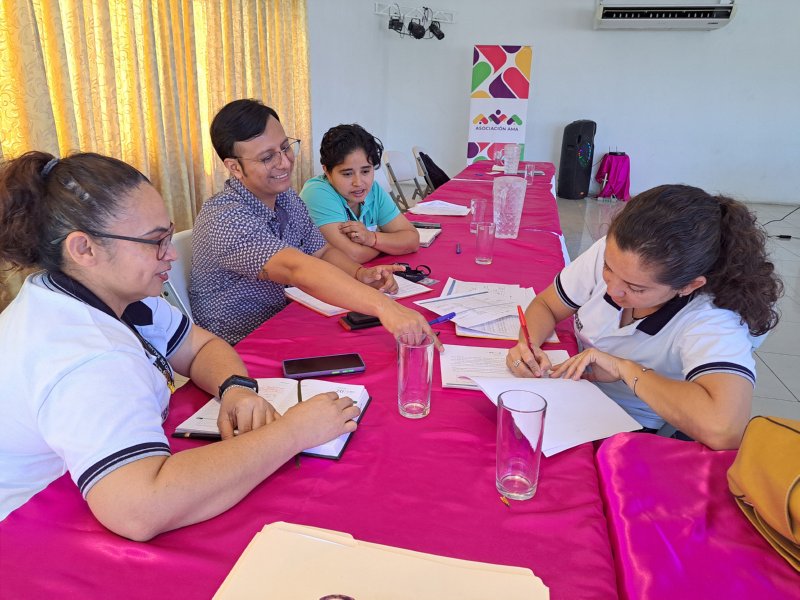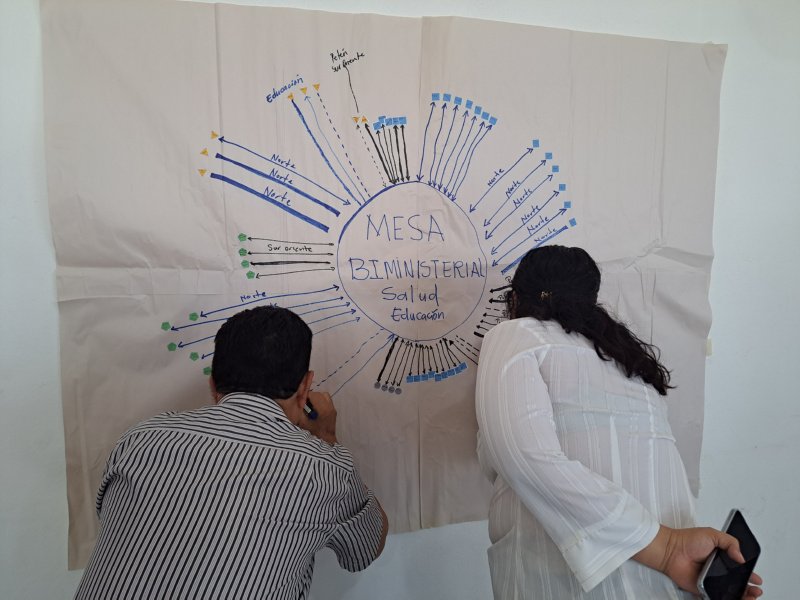
Project Name:
Linking and Strengthening Strategic Actors to Increase Access to Sexual and Reproductive Health Services (2023)
Fecha de inicio: Enero/2023
End Date: January/2023
5,000 Girls and Young Women Benefited
AMA Association firmly believes in the importance of enhancing our operational capabilities as civil society organizations and those of other strategic actors to continue strengthening and ensuring access to sexual and reproductive health (SRH) services for indigenous and mestizo adolescent girls and young women in the communities where they operate.
To strengthen our work in response to this issue, AMA Association implemented the project "Linking and Strengthening Strategic Actors to Increase Access to Sexual and Reproductive Health Services (SRH)." This project enhanced the technical, operational, and advocacy capacities of strategic community actors who provide, manage, and strengthen SRH services, and it was carried out in partnership with the International Community Foundation within the framework of the Central America Grant Fund.
The general objective of the project was: To contribute to increasing direct access to sexual and reproductive health (SRH) services for indigenous and mestizo adolescent girls (AG) and young women (YW) in the department of Petén, Guatemala.
Specific Objectives:
- Increase access and quality of SRH services for 3,600 AG and YW from 6 Health Districts of the department of Petén, through the strengthening of the capacities of 120 indigenous and mestizo grandmother midwives and two inter-institutional fairs on the prevention of adolescent pregnancies.
- Improve coordination, capacities, and links between decision-makers of the Ministry of Health, government institutions, civil society, and AMA, to enhance direct access to SRH services for AG and YW in Petén.
To achieve the project's objectives, the following activities were carried out:
Activities 2023
Six camps were held, each lasting a day and a half, with the participation of 20 indigenous and mestizo midwives and birth attendants from each of the six Health Districts. These were conducted by bilingual staff in Spanish and Maya Q'eqchí from the national reproductive health program of the Petén Sur Occidente Health Area Directorate, the National Movement of Grandmother Midwives Nim Alaxik, and the AMA Association.
The capacity transfer focused on the following themes: Participation in reducing maternal mortality; Roles of the midwife; Care of pregnant women, childbirth, and newborns; Referrals, Health Commission and Responsible Maternity; Family planning; prevention of early pregnancies; Women's rights; Linkage with health services; and Sharing experiences during the pandemic.
Strengthening the capacities of grandmother midwives in the Petén Sur Occidente Area was timely and appropriate, as they had minimal opportunities for capacity enhancement before the pandemic, with the public health system focused on addressing COVID-19.
Notably, this intervention has significantly strengthened the link between midwives and health personnel from the public sexual and reproductive health services of the Health Districts. Good relations and communication between these actors are key to preventing maternal death. A timely referral to health services can save a life, which is why the strengthened alliance between the aforementioned parties is highly satisfactory. The success also lies in the fact that the work was implemented hand in hand with the reproductive health program, which has been close and professional.
As part of this linkage, it's important to note that the grandmother midwives have engaged in new activities in coordination with the health personnel of the national reproductive health program of the Petén Sur Occidente Health Area, such as participating with a stand at the inter-institutional fair for the prevention of adolescent pregnancies, thereby strengthening their connection with the institutional system and public sexual and reproductive health services.
Also, having bilingual personnel in the health staff and AMA has strengthened capacity transfer and cultural relevance, as 90% of the grandmother midwives are Maya Q'eqchí. Hence, the teaching-learning process has been favorable.
Four meetings of the departmental "Prevent with Education" Technical Table were held in Petén, with representatives from government institutions, civil society, and the Congress of the Republic participating.
In this context, the coordination, capacities, and linkage between decision-makers from the Ministry of Health (3 Health Area Directorates of Petén), Ministry of Education, Petén's Deputy in the Congress of the Republic, Ministry of Social Development, Secretariat against Sexual Violence, Exploitation, and Human Trafficking (SVET), National Youth Council (CONJUVE), Tan Uxil Association, Actions for a Healthy Life Association, and AMA Association were strengthened.
This initiative improved direct access to SRH services for more than 45,000 adolescent girls (AG) and young women (YW) in the department of Petén, through activities established in the Strategic Plan of the departmental "Prevent with Education" Technical Table of Petén, which was set by the aforementioned actors.
This has prioritized the unification of government and civil society institutions to improve access to sexual and reproductive health services and strengthen the prevention of adolescent pregnancies in Petén, especially in the jurisdiction of the Departmental Directorate of Integrated Health Service Networks of Petén, South West Area (recently renamed, previously known as the Petén South West Area Health Directorate). This geographical area (municipalities of Sayaxché, La Libertad, and Las Cruces) has historically had the highest rate of maternal death and adolescent pregnancies in Petén, with 11 maternal deaths recorded in 2022 and 2 from January to April 2023. Additionally, the municipality of Sayaxché had the highest rate of adolescent pregnancies in Guatemala in 2022, with 64 pregnancies in girls aged 10 to 14.
AMA-led actions and advocacy have enabled the aforementioned actors to strengthen their efforts in preventing early pregnancies, improving the coverage of sexual and reproductive health services, and directly benefiting 5,429 adolescent girls and women in that area.
Actions included strengthening adolescent-friendly spaces, inter-institutional fairs for the prevention of adolescent pregnancies, tracking and follow-up of adolescent pregnancies, prenatal control monitoring for adolescents under 14 years old, meetings with midwives, formation of emergency committees, screening for cervical cancer detection, and coordination of responsible parenthood and maternity tables. Although much remains to be done, these initiatives significantly strengthen access to sexual and reproductive health services and the prevention of adolescent pregnancies in the department of Petén. Interactive training camps were also planned with indigenous and mestizo Maya Q'eqchí grandmother midwives from the Health Districts of South Petén. These began on International Women's Day, aiming to strengthen access to comprehensive and differentiated health for adolescent girls and women in South Petén.
AMA Association participated in the first inter-institutional fair for the prevention of adolescent pregnancies in the Tierra Blanca Health District, Sayaxché, Petén. The fair aimed to raise awareness about the importance of preventing pregnancies and sexual violence among adolescent boys and girls from the indigenous and mestizo communities' basic education institutes in the aforementioned district.
The event was attended by 600 adolescent girls and boys, who had the opportunity to visit the informative stands of participating institutions. At these stands, they received information on ways to prevent pregnancies and sexual violence in girls and adolescents, family planning methods, sexual and reproductive rights, mechanisms for reporting violence, women's rights, adolescent girls' rights, and the roles of the participating institutions.
Participating institutions included the Ministry of Health, Secretariat against Sexual Violence, Exploitation, and Human Trafficking (SVET), Ministry of Social Development, Ministry of Agriculture, Livestock and Food, Guatemalan Army, Municipal Women's Office of Sayaxché, Petén, Midwives of Sayaxché, Public Ministry, and AMA Association.
The fair provided a framework for empowering adolescents about their sexual and reproductive rights, which is key in preventing early pregnancies.
Results Achieved 2022-2023
- Interactive Training Camps on Differentiated Attention in SRH
120 indigenous and mestizo midwives and birth attendants from the six Health Districts of the Petén Sur Occidente Health Area participated. - Meetings of the "Preventing with Education" Technical Table in the Petén Department
40 officials from the three Health Area Directorates of Petén, the Departmental Directorate of Education of Petén, the Congressman of Petén in the Congress of the Republic, Ministry of Social Development, Secretariat against Violence, Exploitation, and Human Trafficking (SVET), National Youth Council (CONJUVE), Tan Uxil Association, Actions for a Healthy Life Association, and AMA Association took part. - Interactive Training Workshops with Health District Staff in Southern Petén
600 indigenous and mestizo adolescent boys and girls from the basic education institutes of the Tierra Blanca Health District, Sayaxché, Petén, participated.
- 3,000 adolescent girls and young women, Maya Q’eqchí and mestizas, from communities living in poverty in the Southwestern region of Petén, received care from grandmothers, midwives, and birth attendants.
- 45,000 adolescent girls and young women from the Petén department benefited through activities established in the Strategic Plan of the "Preventing with Education" Technical Table in the Petén Department.
- 600 adolescent girls from the communities that make up the Tierra Blanca Health District, Sayaxché, Petén, who study in primary schools, were directly involved.
Volunteering:
120 indigenous and mestizo midwives and birth attendants from the 6 Health Districts of the Petén Sur Occidente Health Area (Tierra Blanca, Nueva Esperanza, Sayaxché, La Libertad, El Naranjo, and Las Cruces, Petén) enhanced their skills.
600 indigenous and mestizo adolescent boys and girls from the basic education institutes of the Tierra Blanca Health District, Sayaxché, Petén, participated.
During the project, access to sexual and reproductive health services was improved for 3,000 indigenous and mestizo adolescent girls and young women. This was achieved through the capacity building of 120 indigenous and mestizo grandmother midwives and birth attendants from 5 Health Districts, and the participation of 600 adolescent girls from a Health District in an inter-institutional fair preventing adolescent pregnancies in the Southwestern region of Petén.
Midwives and birth attendants strengthened their capabilities on topics related to: Prevention of early pregnancies in adolescent girls; Enhancement of knowledge in clean and safe home childbirth care; Identification of danger signs and symptoms during pregnancy, childbirth, postpartum, and in newborns to activate a family emergency plan and prevent maternal and neonatal death; Raising awareness for cervical cancer screenings; Importance of family planning; Prevention of mother-to-child transmission of HIV. Adolescent girls received guidance on pregnancy prevention and responsible sexuality at the inter-institutional fair.
The articulation, capabilities, and linkage between decision-makers from the Ministry of Health (Health Area Directorates of Petén), Ministry of Education, Congressman of Petén in the Congress of the Republic, Ministry of Social Development, Secretariat against Violence, Exploitation, and Human Trafficking (SVET), National Youth Council (CONJUVE), Tan Uxil Association, Actions for a Healthy Life Association, and AMA Association were strengthened.
This improved direct access to SSR services for over 45,000 adolescent girls and young women in the Petén department, through activities established in the Strategic Plan of the "Preventing with Education" Technical Table in the Petén Department, as established by the aforementioned actors.
The Southwestern region of Petén is the geographical area that has historically had the highest rate of maternal deaths and teenage pregnancies in Petén. There were 11 maternal deaths recorded in 2022 and 2 from January to April 2023.
Moreover, the municipality of Sayaxché, the headquarters of the Petén Sur Occidente Health Area, had the highest rate of teenage pregnancies in Guatemala in 2022, with 64 pregnancies in adolescent girls aged 10 to 14 years.
The donor who funded this project











































